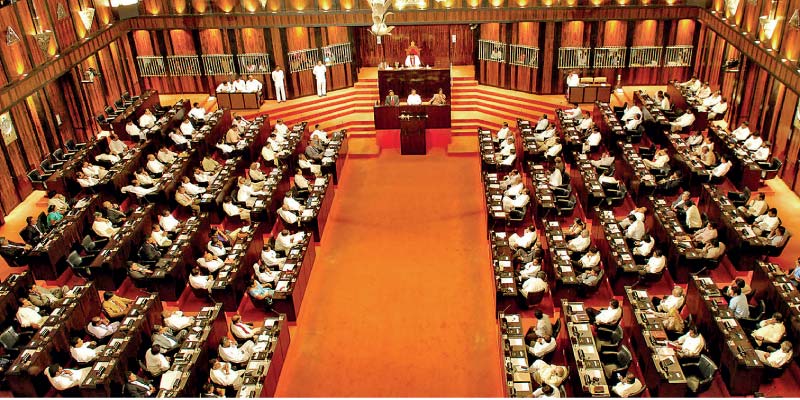Friday Feb 20, 2026
Friday Feb 20, 2026
Monday, 27 May 2024 00:30 - - {{hitsCtrl.values.hits}}

Given the massively controversial nature of some of the foreign direct investment being negotiated by this Government, those who question what looks like the unseemly hurry to enact this Bill, have a point
 The recent gazette on Economic Transformation, Part II of 10 May 2024 issued on 14 May by the current Government is being hotly debated both inside and outside of Parliament since it is sought to be included in our corpus of laws and therefore assumes a greater interest and significance not usually accorded to policy.
The recent gazette on Economic Transformation, Part II of 10 May 2024 issued on 14 May by the current Government is being hotly debated both inside and outside of Parliament since it is sought to be included in our corpus of laws and therefore assumes a greater interest and significance not usually accorded to policy.
It is observed that the changes to the structure and the architecture of economic management proposed in the Bill that are to be incorporated into law, are those driven by an unelected President with mere months to finish his term. The Parliament is being urged to delay this Bill until a President is elected in a few months, to implement necessary changes for which a mandate from the people has been received and therefore also their support, rather than their mistrust and hostility.
The Economic Transformation Bill conceives of several brand-new institutions which Sri Lanka has not seen before, in order to deal with the economic crisis. Some of those, described as corporate bodies, seem to operate by-passing existing structures and Ministries, with new lines of authority and wide-ranging powers vested in individuals appointed by the President for three-year terms.
They are authorised to have their own funds and recruit staff and some even to establish branches overseas and have representatives and staff in other countries. They are also vested with the authority over elected bodies and other government departments, to request and obtain information from them.
A new position of “Ambassador of International Trade” appointed by the President is to take the lead in all trade negotiations, including bilateral and multilateral ones (e.g., the WTO and UNCTAD) with a new Institution (Office of International Trade) to support those activities with wide-ranging powers.
The octopus architecture
An octopus-like network of seven institutions with the President as the head of the octopus hovers over the economy laying claim over all investment decisions, with his appointees heading each tentacle, some occupying more than one institutional responsibility.
While this may conceivably help fast-track investment decisions, it is yet unclear if this arrangement complies with the necessary controls such as the separation of powers and other checks and balances to prevent financial scams, in a country that has been scammed too often by their own leaders. This new structure needs time to be examined by those qualified to do so before being written into law.
The new institutions embedded in the Economic Transformation Bill are as follows:
1. Economic Commission of Sri Lanka, (EC), described as a body corporate:
2.Invest Sri Lanka, described as a body corporate:
3.Investment Zones Sri Lanka, described as a body corporate:
4.Office of International Trade (OIT), described as a body corporate
5.Ambassador for International Trade:
This role seems to mirror and expand the role that Ambassador Milinda Moragoda played in India, where he was given Cabinet rank (for the first time in Sri Lanka by President Gotabaya Rajapaksa) since which time he has negotiated the trade relationship with India, with its expanded role in Sri Lanka’s economy. This model seems to have been exponentially elasticised to cover the global arena as a separate Institution where the designated Ambassador will take the lead in both bilateral and multilateral negotiations on behalf of Sri Lanka.
6.National Productivity Commission, described as a body corporate:
7.Sri Lanka Institute for Economics and International Trade, described as a body corporate:
The gazette covers in painstaking detail the powers, duties, responsibilities and financing of these institution. Two are covered by pledges of secrecy.
Kill Bill?
At first glance it seems like an effort to fast track economic recovery by bringing all matters to do with investments, foreign and local, under the control of the President, including trade negotiations, through parallel structures which are given wide-ranging powers which could possibly come into some conflict with existing structures.
Given the massively controversial nature of some of the foreign direct investment being negotiated by this Government, those who question what looks like the unseemly hurry to enact this Bill, have a point.
While the ongoing negotiations may seem to make economic sense, their electoral, political, geopolitical security and sovereignty implications are being pointed out and debated in the media and in Parliament.
There doesn’t seem to be adequate public buy-in for the Government’s narrative. Critics point out that with the elections round the corner, a popularly elected President is far better suited to design and implement the unquestionably required changes, rather than anyone seen as having caused or been associated with, much of the misery to begin with.